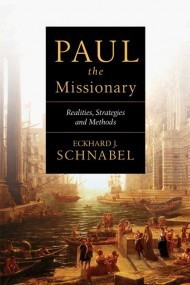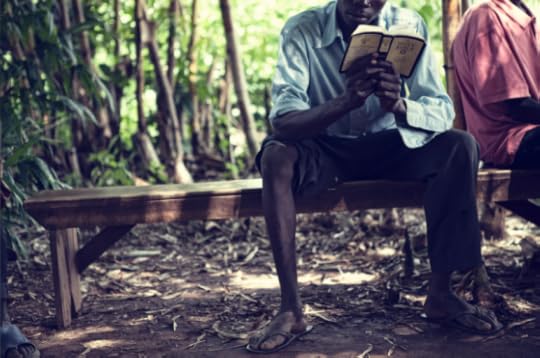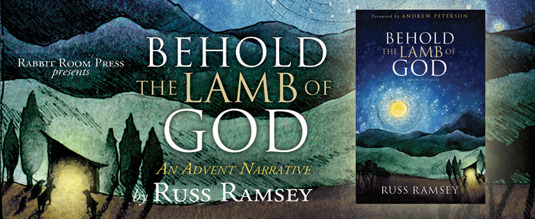Justin Taylor's Blog, page 263
November 22, 2011
Discipleship Curriculum
An Easy Way to Get Study Bibles to God's People in the Global South
From Crossway:
If you're reading this, you have a wealth of theological resources at your fingertips, most importantly God's Word. Unfortunately many Christians in the world don't yet enjoy a similar abundance.
That's why this Thanksgiving week, as a way to raise awareness for how important books are in passing truth on to the next generation, Crossway is inviting you to help send Study Bibles to leaders in the Global South (in partnership with our friends at Desiring God).
It's super easy.
Through next Monday (11/28), for every new "Like" on our Facebook page, Crossway will give $1 worth of Study Bibles through Desiring God's International Outreach initiative. Every Study Bible given will go directly to our brothers and sisters in the Global South, many of whom are hungry for tools to better understand, apply, and share God's Word.
Already "Like" our Facebook page? Consider partnering with us in these ways:
Share this Facebook post with friends
Share this blog post on Google+ or Twitter with the hashtag #givebibles
Link to this blog post from your blog or preferred social network.
May God use these Bibles to encourage many Christians in the Global South!
All ESV Bibles on Sale
Behold the Lamb of God: An Advent Narrative Book
If you are looking for an Advent devotional this year, I would recommend Russ Ramsey's new Behold the Lamb of God: An Advent Narrative (foreword by Andrew Peterson). Russ is a gifted writer and thinker, and he currently serves as a minister of preaching and pastoral care at Midtown Fellowship, a PCA church in downtown Nashville.
Like Andrew's album, this book creatively and winsomely retells the old, old story. Jonathan Rogers puts it well:
Russ Ramsey tells a story you've heard a hundred times and still haven't heard enough. With remarkable attention to the facts of the matter—the water dripping from John the Baptist's beard, the heft of Abraham's knife, the groans of a girl giving birth on a stable floor—Ramsey brings to life the story that brings us to life. Here is glory made visible, tangible, audible. Which is to say, here is the Incarnation.
Reprinted below is the first reading from the book.
He did not have a home.
People said he survived on little more than wild honey and locusts, and by the look of him, it couldn't have been much more. He wore a coat of camel hair he cinched together with a leather belt, just like the prophet Elijah had done.
Normally he was the one people stopped to behold, but at this particular moment, as he stood waist-deep in the Jordan, anyone looking at him saw that his attention was fixed on the man from Galilee headed his way. His face wore a mix of astonishment and joy as the man approached.
"Behold! The Lamb of God who takes away the sins of the world!" His voice trembled as water dripped from his outstretched finger and scraggly beard into the river where he stood.
People might have dismissed this wild man as they would have any other tortured soul driven to live in the caves and wadis of the Judean wilderness—were it not for the fact that people knew his story. Or rather, they knew his parents, Zechariah and Elizabeth.
These were honorable people. Zechariah had served many years as a priest in the temple, Elizabeth faithfully at his side in spite of the fact that, well into their old age, they had been unable to conceive any children.
Being a priest, Zechariah knew the old stories of the barren women God had worked through to deliver impossible promises to an unbelieving people—to their people. When Zechariah and his wife were young, these tales gave them hope. God could break through her barrenness if he wanted. He had done it before. But that was a long time ago, and the stories were about people whose lives were central to Israel's identity. Zechariah and his wife hardly regarded themselves as that important.
Eventually they accepted that they would be childless, though they wondered why the God they loved and served had determined, in his infinite wisdom, that they wouldn't know the blessing of children.
Then one day the Lord sent his angel down with a message. The Author of Life was going to open Elizabeth's womb and give Zechariah a son. But this son wasn't given merely for his father's legacy. This boy would have a specific function in the unfolding story the people of Israel had been living and telling as far back as anyone could remember.
The angel told them, "He will turn many of the children of Israel to the Lord their God, and he will go before him in the spirit and power of Elijah, to turn the hearts of the fathers to the children, and the disobedient to the wisdom of the just. He will make ready for the Lord a people prepared."
And they were to give him the name John.
As a boy, John grew and became strong in the Spirit. His little mind was filled with wonder as he turned over the stories his parents told him about his birth. Angels were involved, and miracles. He was their miracle, a gift given by God himself not only to his grateful parents, but to the world. Everyone knew John as the boy with an intensity beyond his years—as though his entire boyhood was a time of preparation and he knew it.
Not long after the boy became a man, he moved out into the wilderness of Judea. It was an inhospitable place— windy, craggy, and hot. It was also the sort of place where God had dwelled with his ancestors during the Exodus. There, without the simplest of creature comforts, John was left to find solace and companionship with God alone.
Though his days in the desert could be lonesome to the point of pain, wilderness life suited him. It was a contemplative way to live, but one that strengthened him. He had no basic needs that he could not meet. Many of his days were filled with simple tasks such as finding water, scrounging food, staying out of the heat of the sun, and gathering wood for fires at night. Living off the land meant he needed to travel light. He needed to be able to go where the resources were and move on when they were spent.
But it wasn't just minimalist living that brought John to the desert; it was his call from the Lord to proclaim the message he had been born to tell. John didn't move to the desert to withdraw from his people. He went to prepare for his role among them.
Soon he emerged as a man with a voice and a clear con- science about how to use it. Wild and fearless, looking like he had grown out of the banks on which he stood, he called to all who passed, "Repent, for the Kingdom of Heaven is at hand!" And he did it as one who seemed to possess the authority to demand such a response.
He was, as the prophet Isaiah had said, "The voice of one crying in the wilderness: 'Prepare the way of the Lord. Make his paths straight.'"
Prepare for what? A collision of worlds. Like a meteor falling to the earth, heaven was bearing down on the land of his forefathers. An old promise, so old that it had become little more than a legend, was about to be fulfilled—and nothing would ever be the same.
The Messiah was coming.
The very fact that so many people considered the Messiah's coming more of a fairy tale than a future event was, in itself, a cause for repentance. It wasn't just that God had promised to do it. It was that the reason he promised to do it was like an intimate promise between lovers. God's promised Messiah was a merciful gift of love to a people who needed both mercy and love. He would come to them in all their pain, brokenness, and struggle, and make everything new. They were desperate for this, and the proof of their desperation was perhaps most evident in the fact that they couldn't bring themselves to live as though this promise was real.
Repent! The Kingdom of Heaven is at hand!
There was something magnetic about John, something in the way he suspended those he attracted between the poles of preparation and perdition until they understood that without repentance, there they would hover—not necessarily feeling lost perhaps, but not assured that they were found either. Hope began to rise in the hearts of the hopeless. Even in the call to repent, they heard the promise that if they confessed their sins, admitted their doubts, and acknowledged how their hearts had become cynical and jaded, God would hear them. God would hear them.
People came from all over to the Jordan to step into that water with John the Baptizer. They confessed their failures, their lust, their greed, their pride. They admitted to him things they swore they would never tell a soul.
But why? Who was he?
Israel's religious leaders had no answer, so they sent priests to investigate. Did this man think he was the Messiah? Or Elijah come back from his celestial chariot ride?
John was clear in his answer. He was neither Elijah nor the Messiah.
So the priests asked him, "Then why are you baptizing, if you are neither the Christ, nor Elijah, nor the Prophet?"
John told them, "I baptize with water because there is a man, one who stands among you, and the strap of his sandal I'm not worthy to untie. Though you do not know him, he lives among us even now, and he is the Messiah!"
Should they have known him? Or, if nothing else, should they not have been surprised at John's rebuke? These were the priests of Israel, experts in the law and lore of God's chosen people. Israel was a nation with a story, a well-rehearsed narrative these priests were sworn to preserve and pass down. John himself was a part of that tale, and so were they. And yet, like so many of their countrymen, they had begun to forget the story of God's promises to them.
But it was such a beautiful story. It was the story of how their holy God had cut a covenant promise in blood to redeem and restore the children who had rebelled against him. It was the story of how Jacob's line came to be a nation—sometimes mighty, sometimes fragile, but always prone to wander and forget their God.
It was the story of generations of war, infighting, and exile that should have wiped them off the face of the earth. The fact that they survived all this and so much more testified to God's fidelity to his promise never to leave them or forsake them. That alone proved God was not through with the story he was writing. And if that was true, it meant he wasn't through with them either.
Even though it was still unfolding, it was already quite a story to tell, and it was the priests' job to tell it. But in order to tell it, they had to know it. And to know it, they had to listen—which was why, since their earliest recorded history, every time the people of Israel gathered before the Lord for worship, the first word spoken to them was a command:
"Hear!"
You can buy the book (along with the CD) from the Rabbit Room, or you can get the book at Amazon and elsewhere.
November 21, 2011
Who Was Charles Wesley?
Holy productivity: "He wrote between six thousand and nine thousand hymns and sacred poems (depending upon what one is willing to call a hymn or poem), and more than four hundred of these continue in contemporary Christian hymnals."
—John R. Tyson, Assist Me to Proclaim: The Life and Hymns of Charles Wesley (Grand Rapids: Eerdmans, 2007), viii (HT: Fred Sanders).
Here is a brief introduction to the man:
Paul's Missionary Strategies and Methods
 Some summaries and conclusions from Eckhard Schanbel's Paul the Missionary: Realities, Strategies and Methods (IVP, 2008):
Some summaries and conclusions from Eckhard Schanbel's Paul the Missionary: Realities, Strategies and Methods (IVP, 2008):
What is "mission"?
Schnabel defines "mission" or "missions" as "the activity of a community of faith" that
distinguishes itself from its environment in terms of both religious belief (theology) and social behavior (ethics),
is convinced of the truth claims of its faith; and
actively works to win other people to the content of faith and the way of life of whose truth and necessity the members of that community are convinced. (p. 22)
Movement and Intentionality
Schnabel sees movement and intentionality as two core components of mission.
"Jesus asserts [in Luke 4:18-19] that he has been sent by the Lord God to the Jewish people (movement) in order to bring good news (intention)."
"Paul describes his own mission in terms of movement (sent to the Gentiles) and in terms of intentionality (to proclaim Jesus Christ) [cf. Gal. 1:1, 15-15]." (pp. 25, 26-27, my emphasis)
What did apostolic missionaries do? (pp. 28-29)
"Missionaries communicate the news of Jesus the Messiah and Savior to people who have not heard or accepted this news. . . ."
"Missionaries communicate a new way of life that replaces, at least partially, the social norms and the behavioral patterns of the society in which they new believers have been converted. . . ."
"Missionaries integrate the new believers into a new community. The new converts become disciples. . . ."
Missionaries:
establish contact with non-Christians,
proclaim the news of Jesus the Messiah and Savior (proclamation, preaching, teaching, instruction),
lead people to faith in Jesus Christ (conversion, baptism), and
integrate new believers into the local community of the followers of Jesus (Lord's Supper, transformation of social and moral behavior, charity).
Paul's missionary goals (pp. 34-37)
"Paul knew himself to be called to preach the message of Jesus Christ." [Rom. 1:1; 1 Cor. 2:2]
"Paul knew himself particularly called to preach the gospel of Jesus Christ to Gentiles, that is, to polytheists who worshiped other gods." [Rom. 1:14; 1 Cor. 1:23; Rom. 1:16]
"Paul's goal was to reach as many people as possible." [Rom. 1:14; 15:19, 23-24]
"Paul seeks to lead individual people to believe in the one true God and in Jesus Christ, the Messiah, Savior and Lord." [1 Thess. 1:9-10; 1 Cor. 1:18-2:5]
"Paul established new churches, communities of followers of Jesus Christ—both Jews and Gentiles, men and women, free and salves—and teaches the new believers the Word of God, the teachings of Jesus, the significance of the gospel for everyday living." [Col. 1:25-29]
Paul's missionary methods (pp. 34-37)
"The oral proclamation of the gospel was a fundamental element of the missionary work of the early church."
"Geographical movement from city to city, from region to region, and from province to province was a principal element of missionary work in the first century."
"Since the goal of missionary work is to reach as many people as possible with the gospel, Paul went to any locale in which people would be willing to listen to the message of Jesus Christ."
"Since Paul wanted to reach all people in a given location, matters of ethnic identity, class, culture, or gender did not control his missionary focus."
"As people in antiquity were accustomed to encountering and listening to traveling orators, the expectations and the procedures that are triggered in such encounters had to be considered."
Samaritan's Purse Gift-Giving Catalog
This catalog is a nice way to involve your children in helping to meet global needs in the name of Christ.
November 20, 2011
How the Synoptic Gospels Help Us See Jesus' Authority from the Ground Up
One of the things I appreciate about Darrell Bock (research professor of New Testament studies at Dallas Theological Seminary) is that he's not only a world-class gospels scholar, but he also has a heart for the church and for the lost, along with an ability to communicate his research in a winsome and accessible way.
Here's a 40-minute talk he gave on some of the ways that the Synoptic Gospels (Matthew, Mark, and Luke) establish Jesus' authority one step at a time, from the ground up:
November 18, 2011
Man Up!
Over 20 years John Piper lamented:
Little help is being given to a son's question, "Dad, what does it mean to be a man and not a woman?"
It's easy to be discouraged about this rampant confusion in our culture (and in our churches), and it's easy to worry deeply about the ongoing crisis of absentee fathers and delayed (or perpetual) adolescence.
But I'm encourage by the new "Man Up" campaign by ReachLife Ministries and Reach Records.
Even if this isn't your "kind of music," maybe you'd consider stopping and praying for a moment that God would use these gospel-centered brothers to make a real difference in helping a lost and hurting generation—especially in the urban context—discover what it means to be a real man in Christ.
You can go get an MP3 for the "Man Up Anthem," and watch the video below:
Here's a trailer for the short film they are working on in connection with the album:
More explanation of the whole vision and campaign below.
THE PROBLEM
There's an ongoing war within urban culture. Confusion over what manhood is has plagued our cities, families and lives. The concept of a biblical man has been lost in our generation. Unfortunately, many churches struggle to provide its urban members, much less those beyond their walls, with a tangible definition of a real man.
THE CAMPAIGN
In partnership with ReachLife Ministries and Reach Records, Man Up is a new campaign, calling men in the hip-hop culture to true biblical manhood through repentance and faith in Christ.
The campaign consists of a short film, small group curriculum, music soundtrack and concert series. It is our call for men in urban culture to repent for their failure to become the men that God has created them to be and for believers to live as who they truly are in Christ.
THE SHORT FILM & CURRICULUM
The short film takes a look at six different areas of manhood that young men fail to live up to. By taking a look at the common challenges and responses of young men in urban culture, we hope to reveal the need for clarity on what being a man truly means.
A curriculum is also available through ReachLife Ministries to accompany the short film and promote further discussion in small group settings.
THE SOUNDTRACK & CONCERT SERIES
The soundtrack of Man UP is from Reach Records and delves into the concepts addressed in the film and curriculum. Later this year, audiences can experience a showing of the film, a panel discussion on manhood, and a live concert as the Man Up concert series makes stops in select cities.
It is our hope that men everywhere will answer the call to Man Up!
Don't Forget Missions in Your Mission
Ed Stetzer interviews Bruce Ashford, dean of the college at Southeastern Baptist Theological Seminary and the editor of the new book Theology and Practice of Mission: God, The Church, and the Nations. He explains why the longest section of the book is on the church's mission to the nations:
Revelation 5 is perhaps the most breathtaking and powerful vision in all of Scripture, and it serves as the climax of a major thread that runs throughout the Scriptures–God's determination to make himself known to the nations so that they may worship him. In this vision that God gives to John, all of heaven bursts forth into praise of the Lamb who was slain. Among those represented are worshipers from every tribe, tongue, people, and nation. This is the vision that drives us–that our Lord will be worshiped from all corners of the globe.
And yet there are almost 2 billion people who have little or no knowledge of Christ. In many corners of the globe there are no churches, no Bibles, and no Christians to bear witness. I repeat, there are hundreds of millions, upwards of 2 billion people, who could leave their homes and search for days and months, and never find a church, a Bible, or a Christian.
Our great privilege and responsibility is to bequeath to them the treasure that was given to us–the faith once for all delivered to the saints. I hope that the recent movement toward church planting and revitalization leads toward an equally powerful movement to take the gospel to every corner of the earth until there is a church within walking distance of every house on this planet.

Photograph by Josh Dennis
Justin Taylor's Blog
- Justin Taylor's profile
- 44 followers






